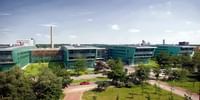The COSSE Master's programme is a two-year programme including compulsory mobility for the students. They will enter in one of the universities and continue the second year at one of the other universities in another country. The first 60 ECTS credits are taken at the first year university and the remaining 60 ECTS credits are taken at the second year university.
The programme includes three semesters of courses followed by the fourth research semester spent on the Master's Thesis (30 ECTS credits) under the supervision of both attended university. The students receive doubles degrees, i.e a degree from both the home and the host university.
The COSSE-students will become very familiar with the tools of CSE, which includes:
- mathematical modeling techniques
- simulation techniques (discretizations, algorithms, data structures, software in CSE)
- analysis techniques (data mining, data management, visualization)
The students will become experts in the generic tools as applied to one of the specializations offered by the universities. Upon graduation from COSSE the students have acquired
- familiarity with selected scientific and engineering application areas and their mathematical models
- a knowledge base and skills ranging from formulation of a mathematical model to constructing software for high-performance computer architectures
- effective communication skills for interacting with the professional community as well as management and the society at large, on written and oral presentations
- a degree of independent and critical appraisal of the capability and limitations of, and results produced by, computational modeling.
As for career opportunities, a COSSE Master's degree opens several opportunities:
- to join the international research community by continuing PhD-studies in CSE and science/engineering fields where simulation and high-performance computing is applied: fluid dynamics, electromagnetics, molecular physics, quantum chemistry, material science, chemical engineering, structural mechanics, biocomputing, and many more
- to employment in "end-user" high-tech industry and "provider companies", using and development tools for advanced computer simulation in pharmaceutical, automotive, materials, aeronautics, power generation, micro-electronics, etc. industry.
- to start new innovative companies which are based on CSE expertise.















